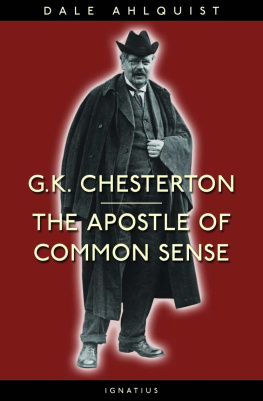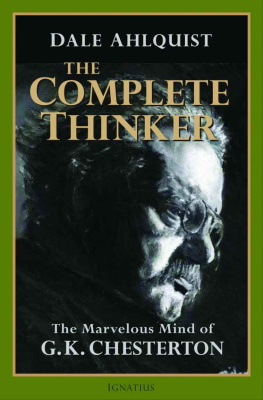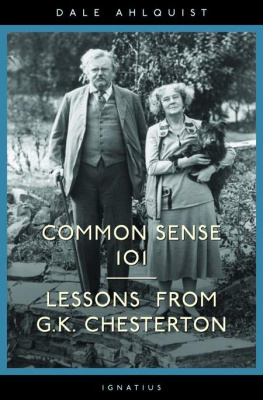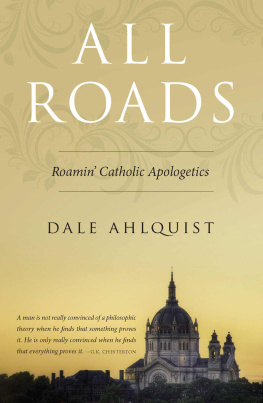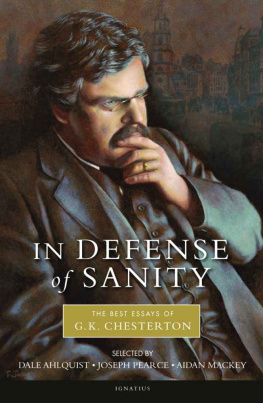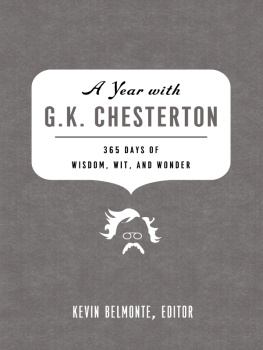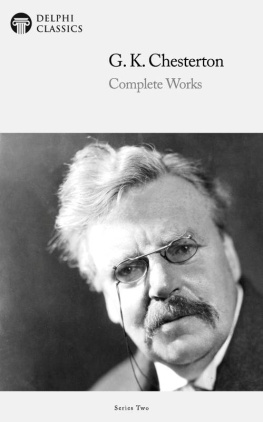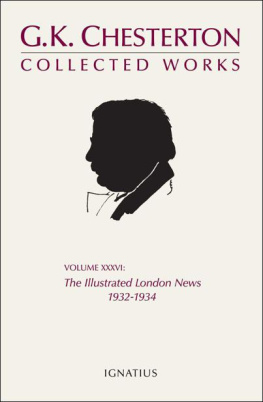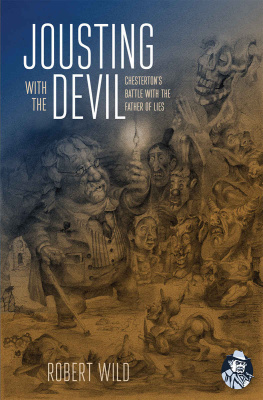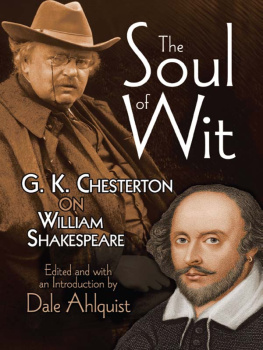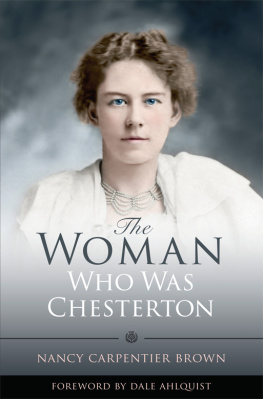G. K. CHESTERTON:
THE APOSTLE OF COMMON SENSE
DALE AHLQUIST
G. K. CHESTERTON:
THE APOSTLE OF
COMMON SENSE
IGNATIUS PRESS SAN FRANCISCO
Cover design by Roxanne Mei Lum
2003 Ignatius Press, San Francisco
All rights reserved
ISBN 978-0-89870-857-8 (PB)
ISBN 978-1-68149-042-7 (EB)
Library of Congress Control Number 2002112866
Printed in the United States of America
To My Parents
who first taught me what Chesterton
only confirmed,
that
Thanks are the highest form of thought.
Contents
PREFACE
There are some people who for some reason think it is pretty funny that I read my first Chesterton book while I was on my honeymoon and that the name of the book was The Everlasting Man and that my bride was reading Les Miserables. Really.
The Everlasting Man may not be the best first book to read after getting married, but it is also not the best first book to read by Chesterton. Except that there is no best first book to read by Chesterton. Whatever book one chooses to read first, it seems it would have been better to have read one of the others first. Or several of them.
Still, you have to start somewhere, because not to read G. K. Chesterton is simply to cheat yourself of the incomparable experience of entering a world that is more invigorating and refreshing and awe-inspiring and complete than anything created by any other writer of the last century. By the time you read your third or fourth book by Chesterton, you will find that you have gotten past the problem of reading the first one.
While the perfect introduction to the marvelous GKC will likely elude us a bit longer, I am hoping this book may fill the need in the meantime. It arose from a television series I hosted that was created to introduce people to Chesterton. It is designed only to whet the appetite, but with Chesterton it is easy to fill up on appetizers. And perfectly acceptable.
And while this book focuses more on Chestertons Catholic and Christian writings than on his novels or poetry or literary criticism, this serves to give a useful perspective for the rest of his writings. The tales are told one by one, but every single idea is inextricably connected to every other idea. No matter what you choose to say about Chesterton, you will necessarily leave something else out; but whatever the case, his faith is not something that can be ignored. It is not just one aspect of his work. On the contrary, it is the great dome over all. It is the place to begin and end. After all, nothing makes sense unless everything makes sense.
I would like to thank Steven Beaumont and all the folks at Eternal Word Television Network for doing such an excellent job of bringing the Chesterton series to life, which in turn made this book possible. Thanks, too, to John Peterson, Chestertonian extraordinaire and worlds greatest expert on Father Brown, for his help not only with the Father Brown chapter but for his years of gathering great quotations when he edited the Midwest Chesterton News. Gratitude also to the wizard Peter Floriani, without whom I would still be looking up references. And I could not have accomplished any of this without the unending love and support of my wife, Laura, and my children, Julian, Ashley, Adrian (whose middle name is Chesterton), Sophia, and Landon.
The most special thanks go to Chuck Chalberg, the Man Who Was Chesterton in the series and who contributed so vitally to every page. His talent is matched only by his humility. I will never forget the fact that when I was writing the scripts in which he would portray G. K. Chesterton, he actually worried that he was getting all the good lines.
An Introduction to
the Apostle of Common Sense
The most dangerous thing in the world is to be alive; one is always in danger of ones life. But anyone who shrinks from that is a traitor to the great scheme and experiment of being. What Is Right with the World
One scholar called him one of the deepest thinkers who ever existed. He was recognized everywhere he went and loved by everyone who knew him. He was a master of the written word, a poet, a philosopher, a literary critic, a debater, a journalist, and a champion of social justice. What is he best remembered for? His detective stories.
Let us start by getting something straight: G. K. Chesterton was the best writer of the twentieth century. He said something about everything, and he said it better than anybody else. He was incredibly prolific. And incredibly profound. His prose was poetic, and, unlike most modern poetry, his poetry was also poetic. He was intuitive, incisive, and besides that, he was funny. To read him is to enjoy him.
But hardly anyone reads him anymore. He is the most unjustly neglected writer of our time, and we neglect him at our peril.
Chesterton is no longer taught in schools, but students should not consider themselves educated until they have read him. Furthermore, reading Chesterton is almost a complete education in itself. He covered all the bases. Art and literature. History and philosophy. Economics and social reform. Religion and politics.
Why is Chesterton neglected? Because the modern world finds it much more convenient to ignore him than to risk engaging him in an argument, because to argue with Chesterton is to lose. Chesterton argued eloquently against materialism and scientific determinism, against relativism, agnosticism, atheism, and other diseased philosophies that have infected the halls of academia for more than a century. He also argued against both socialism and capitalism and showed why both have been the enemies of freedom and justice in modern society.
And what did he argue for? What was it he defended? He defended the ordinary man. He defended the family. And he defended the Catholic faith. Perhaps that is why he is neglected. The modern world prefers writers who excuse sin, who scoff at Christianity, who deny the dignity of the poor, and who think freedom means no responsibility.
In 1905, a famous London newspaper, the Illustrated London News, hired Chesterton to write a weekly column. He was told he could write about anything he wantedexcept religion and politics. Chesterton responded by saying there was nothing else worth writing about. As he would later observe,
Religious liberty might be supposed to mean that everybody is free to discuss religion. In practice it means that hardly anybody is allowed to mention it.
Chesterton went ahead and wrote the column for the next thirty years, and every week he wrote about religion and politics. He never backed away from controversy, but if you think about it, every controversy, every argument, every discussion is really about religion or politics. Or both. Religion has to do with our relationship with God. Politics has to do with our relationship with our neighbor. These are controversial for the simple reason that all the problems in the world come from our failure to obey the two great commandments: to love God and to love our neighbor.
The Bible tells us to love our neighbours, and also to love our enemies; probably because they are generally the same people.
Chesterton was controversial, and still is, because he took the trouble to defend simple, basic truths. The First Things. The Permanent Things. In spite of what the newspapers say, in spite of what the colleges teach, and in spite of what laws the politicians make, most people hold certain basic truths in common. Chesterton said that the common things are not commonplace; they are terrible and startling, death, for instance, and first love. In the modern world, common sense and the common man are under constant attack.
Modern emancipation has really been a new persecution of the Common Man. If it has emancipated anybody, it has in rather narrow ways emancipated the Uncommon Man. It has given an eccentric sort of liberty to some of the hobbies of the wealthy and to some of the lunacies of those who call themselves cultured. The only thing that it has forbidden is common sense, as it would have been understood by the common people.
Next page
